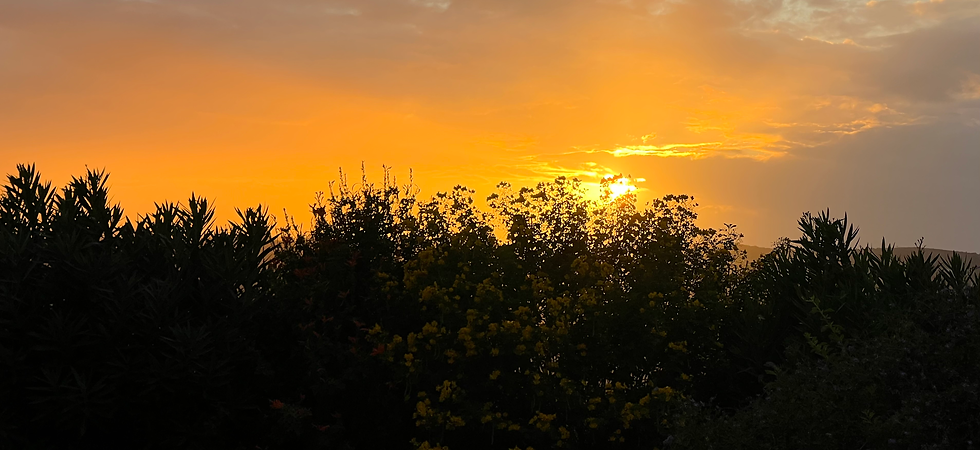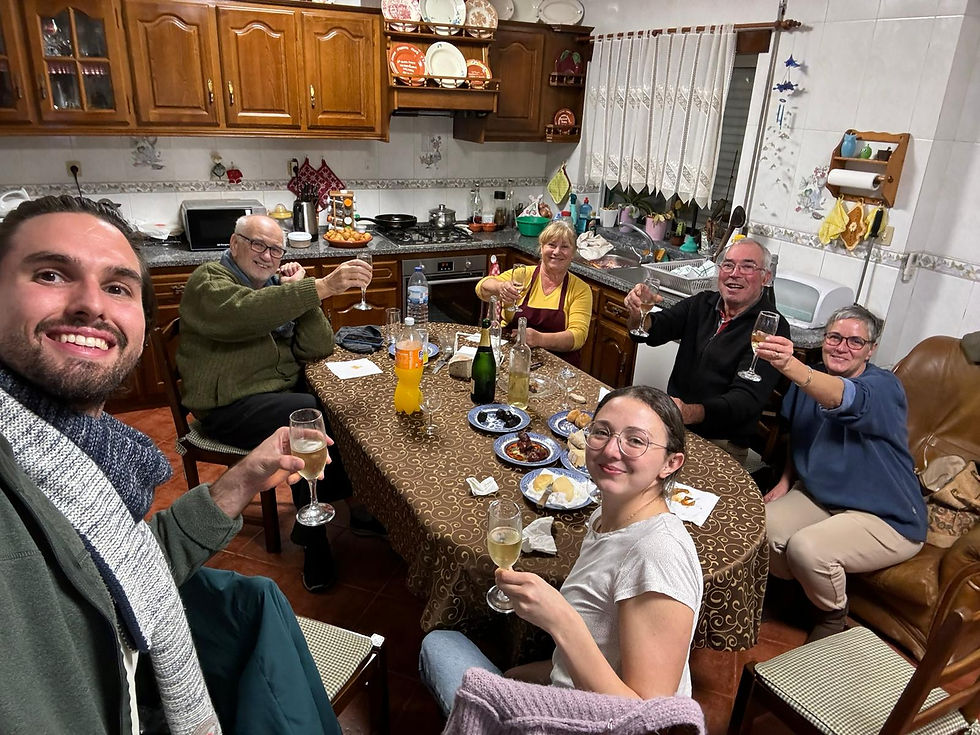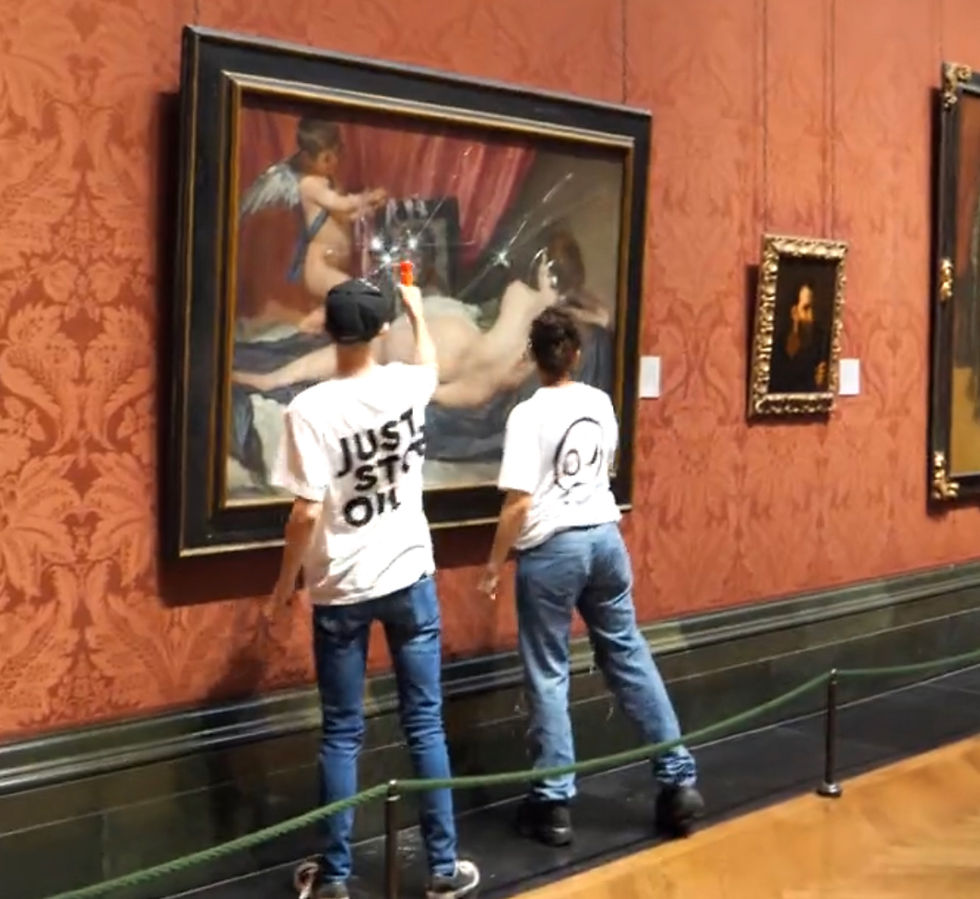
Have We Already Lost It?
Each day, I am getting stronger, although my plumbing system is still challenging. I won’t share the details other than it can take me by surprise from time to time. Blood tests take place later this week and on Monday, I’m meeting with the surgeon to get my biopsy results from the operation and an indication of the success of the operation together with the recommended path forward.
“With cancer, the battle of the mind is just as important as the physical battle of the body.” - Peter McSporran
This past Sunday, which happened to be my birthday, Rozanne said she was off to do some shopping, and despite knowing this, I was concerned about how long she was taking. On her return, I was totally surprised when she arrived back with Selby, our son, with his long-time partner Maggie in tow. What a birthday surprise! I must admit it went briefly through my head, “Surely I am not dying again?” The last time all the kids arrived out of the blue was when I was probably what would be termed closer to death than life. No, it was to join me on my birthday this time, such a wonderful surprise.

“Never give up on life, no matter how little it gives; at certain times, small things, due to circumstances, can mean a lot.” - Peter McSporran
I received so many birthday wishes, mostly on social media from around the world, congratulating me on surviving another year and wishing me well for the next. Thank you all so much. With every message, I try to visualise when I spent time with the sender, be it in the army or just the pub. It seems we, ex-Zimbos, are almost but not quite like the Jews, scattered to every corner of the earth, all trying to survive after losing so much. I am proud to call you my friends.
Having been ill and housebound recently, I have been spending too much time on the internet and watching the various news channels. I have listened to every pundit on rugby during the World Cup while also eagerly looking at every new farming podcast I can find. Sports pundits have one common trait: more often than not, they will get it wrong. Further to a man or woman, they are bad losers who want to blame the referee as do the losing team in International Rugby.
“Making excuses does not mitigate underperformance against a stronger or wilier opposition. It never changes the result, so why people seek consolation in it, I do not know.” - Peter McSporran
Watching too much YouTube or similar is not the best for one's stimulation of the brain. A good book is probably a better option, but even scarier is the rise of social media influencers in changing behaviour and instigating militant-type actions. There is only one group of people who get it more wrong than sports pundits: so-called influencers, the latter because truth means little to them. Unfortunately, no one seems to make them accountable, least of all their dumb followers.
“Influencers. These are people with no wish to understand true historical facts nor have the ability or will to interpret present-day events outside their own perceptions, which are often based on downright falsehoods. These purveyors of lies are the most dangerous with an audience of followers too lazy to establish their own independent opinions.” - Peter McSporran
What is shocking is these influencers, under the guise of being experts on specific fields, such as subjects of football to the environment, are now using their time on mainstream television as a means of promoting their personal so-called perceptions of ‘truths’. Nothing could be further from the truth than ‘my truth’.
“There is nothing more stupid than an idiot whose perception of life is based on the utterances of a self-proclaimed expert whose perceptions, in turn, are based on ‘personal truths’ which are obvious utter falsehoods.” - Peter McSporran
The use of social media has many positives, like, for instance, keeping up with friends; it also, at least, brings to your notice how diverse some people’s opinions are in comparison to one's own, especially in regard to what is right and wrong even more significantly in regard to behaviour and social attitudes. Their train of thought amazes me: why smash a valuable picture in a gallery on your efforts to stop the use of fossil fuels?

“When society becomes this weak every opportunist infection starts to break out.” Douglas Murray
I laughed the other day when I read a female Stop Oil Now activist requested a delay on her trial date as she had already pre-booked a flight to Australia on that particular day.
Even more confusing is their interpretation of good and bad, the latter at times downright evil like the recent events in Israel. Do they think history has not recorded the facts that they have to re-represent it as they see it under some unknown truth they claim to be their own truths?
The more outrageous the claims, the greater cognisance is taken of it. From their apartments in London, these new-day prophets are happy to tell us how to look after the environment, its flora and fauna, ignoring those that live in and work in the country, categorising them as ignorant hunters and gatherers, there only to exploit animals for their own benefit, ignoring the fact that it is these same country folk that put food on their table even if it is only tasteless highly processed vegan fare.
Just this week, a sheep trapped below cliffs and isolated by sea for two years was rescued by some farmers. These people, including Cammy Wilson, whose podcast ‘The Sheep Game’ I enjoy, thought the best place for this now celebrity sheep was in a farm park where it could live out its days happily without fear of ending up on a plate. Some animal rights activists were protesting outside its new residence within twenty-four hours. After a haircut, the first in two years, it had settled in nicely when these protesters, ‘Animal Rising’, proclaimed she, Fiona, the sheep, was being exploited.
“Sometimes you wonder if the world we live in is still real. Sometimes the action of others make you question your own sanity.”- Peter McSporran

They came to this conclusion because they felt the number of visitors paying the entry charge would increase due to her celebrity status, and this was, therefore, animal exploitation. No mention the entry charges are essential for the animal residents' survival. Funny, the only other way I can see this animal paying its way is by being sold for meat or, if breeding, with its offspring being sold into the food chain. Which is more exploitative, being viewed as a celebrity and alive or eaten? I am sure what the sheep would say, but no, the activists know better.
The pro-Palestinians who have been welcomed into our midst now want to desecrate our Poppy Day by demonstrating on the very same day. This is pure provocation; they would like nothing better than to see the day ruined by confrontation, riots between them and the police or even those paying respects quietly to the fallen.
These people have been welcomed into Britain, and long have they hoodwinked us by claiming they are so-called bone fide refugees or economic immigrants? They do not love us, recognise our rules, or tolerate our religious beliefs or non-beliefs but are more than happy to plunder our support systems using our good nature to take our resources and stretch our patience. They should be reminded that when stretched too far, most things break, sometimes violently. Some even build crime syndicates exploiting not just their own but others and believe rape and murder are allowed in fighting a war in a name of a Jihad, the enemy never clearly defined.
By allowing our traditional rules and laws to be eroded into grey much due to those very same influencers I talked about earlier, we are now, as a society, paying a price for our generosity. Sure, I know not all immigrants or Muslims disrespect our culture and laws, but those that do, the most visible and vocal, unfortunately once again through perception brand all with at the very least some suspicion, which can only bode badly for future integration.
Are we lost? Not yet, but there needs to be a line in the sand with a return to our traditions and rules of society, a return to the proper interpretation of the law, which must apply to all. Punishment must be meted out to those breaking or instigating the breaking of it. Yes, I deem influencers as guilty as, at best, those misguided activists, at worst, anarchists. Now, sympathisers of the Palestinian cause want to hold a march on Remembrance Day, which is Poppy Day. The single most solemn day in the British calendar. Even the Scottish First Minister is in support of a protest by Palestinian supporters on that day. Can you believe that?
Poppies are the symbols of remembering our dead on the fields of conflict following the armistice of the First World War. They represent those poppies growing on the killing fields of Flanders. It also honours military and civilian casualties who died following that war, many of whom died while fighting for world freedom in the Second World War, not just in Europe but in the far corners of the world. Why would you want to antagonise your hosts on such a significant day of Remembrance? I would not know. Is it purely what they and their sympathisers want to do, no different from Just Stop Oil and other idiots? They have no logical argument for their cause; they only offer acts of confrontation, vandalism and even violence to bring attention to us for their cause. It certainly does not stimulate our support for their cause; the very opposite. All the more reason to treat them as criminals, not bona fide advocates of human rights.
The Stricken Lowveld.
In September or early October 1992, I set off to meet the Lowveld farmers in Chiredzi. Rather than using the Commercial Farmers Union (CFU) Nissan Sunny, which had seen better years, I decided to take my diesel Mercedes, which I had recently bought from Allan Banks at a Harare South cattle sale. Although employed by CC Sales, Allan was an informal source of many scarce capital items, including vehicles. I bought more than one vehicle from him over the years; on reflection, I should have paid more attention to their provenance. He got away in his sideline dealings due to his relationship with Robbie Isaacson. The patriarch of the precursor of CC Sales, H. Shapiro and Company. I never entirely understood this relationship, but I presume both benefitted somehow. Sadly Allan was killed by one of his dubious business associates.
Anyway, Selby Chance, Chairman of the Commercial Cattle Association and Ian Millar, the Chairman of the Commercial Cotton Association, travelled with me as both their commodities were important in the Lowveld, as was sugarcane. Sugar had a more informal association with the CFU through the Cane Growers Association despite all growers being farmer licence holders through the CFU. Our first stop was Chivhu for a beer at the renowned Enkeldoorn Hotel before leaving the main road to head towards Gutu, where we were met by the Masvingo Branch Chairman David Henson, a great guy and his wife Annalie, the daughter of the legendary veterinarian Japie Jackson. Here, we were to witness cattle being fed milled leaves and brushwood, with the use of a supplement called Browse Plus for survival in those desperate times. Browse Plus was an ingredient added to the water that allowed ruminants to extract the protein from the leaves and twigs locked up by tannins. Cattle would not get fat on this diet, but they could survive. There certainly was no grazing, although it also helped digest course dry grass and weeds. Mike Duncan developed the product at Agricura, its main ingredient being Polyethylene Glycol. I often wonder what recognition he received for this.
From Gutu, we headed through Zaka, where the devastation of the communal area's cattle was clear to see, with many carcasses and starving animals. I remember we drove through this area at one hundred and eighty kilometres per hour as the roads, normally abundant with cattle, goats, and donkeys, were dearth of both humans or animals of any kind. Unlike commercial farmers who unloaded many of their cattle for slaughter before starvation, even at low prices, communal cattle were kept more as a status symbol and a measure of wealth, often only parted with when used in paying a bride's dowry. Further, they were loathe to sell them as they also used them as draught animals, essential for ploughing when the rain returned to grow crops. Like all farmers, they thought the rains would come before their animals died. That year, this was not to be.
We hardly noticed the difference between the bare soil of Zaka to the bare soil of the commercial ranch land surrounding Chiredzi, the only difference being much of the cattle had already been sold, with those remaining getting some form of supplements coupled with the use of Browse Plus for survival. These were mainly young breeding females, all male young and aged stock having been sold. Some of the cattle had been sent to a survival feedlot at the sugar estates, surviving on a diet of cane tops and molasses. The first ranch was Rob Beverely’s, who was to, over the years, become a good friend and a sensible ally in figuring out the rancher's recovery in the area. On arrival at the Tambuti Lodge, we were surprised to see the owner, a Lowveld legend, Tommy Warth, chasing a polo ball around on horseback at an age close to seventy. That night, many ranchers and cane growers, including game ranchers, came to discuss their plight, allowing us only to leave the bar in the early hours, causing an uncomfortable following day. The next day, we spent time looking at cattle in the feedlot being fed cane tops and molasses. From the 80s through to 1992, molasses was used for ethanol production rather than stock feed, with about 10 to 15% ethanol being blended into our petrol. They said it was not detrimental to our engines. Boat owners, I am sure, would beg to differ; just ask the owner of a boat with an outboard who forgot to burn off all the fuel in his carburettors. Many a boat sat at the lakeside or even stranded in the middle of the lake with its engine unable to start due to the adhesive-type gel that had clogged its carburettors and fuel lines as a direct result of the ethanol blend.
From the feedlot, we went and saw Ian Middleton's unique way of herding large numbers of cattle to ensure protection from predators; yes, there were plenty of lions there. He did it by means of natural herding, using cattle horns and lead cows to ensure a protective herd structure. Ian's cousins and uncle had worked for me for a number of years; Zimbabwe was a small country in population, not an area. Food was also sent from the highveld in the form of hay not just to help save the cattle but also some of the wildlife, which was also devastated. Elephants fare very badly in drought.
The meeting at the lodge was very constructive, all about community survival and what could be done to assist the Lowveld cattle herd recover when the rains returned. That is except for the environmentalists who, for some reason, like flies on dung, rolled up in their droves to present us with their own theories and pass blame not on the weather but the ranchers. The common call was that the destruction and devastation of the Lowveld flora was caused by the ranchers and the communal farmers having too many cattle. That is overstocking. That could be said of the communal farmers where slaughter offtake was low, but not on commercial ranches where most ranchers stuck to the correct stocking rate advocated for their environment. These environmental zealots went further by saying the Lowveld would never recover for the good of the wildlife and was definitely finished for the production of beef from grass. For those that do not know, the grasses in the Lowveld were known as sweet veld, which was renowned for rearing and finishing cattle without the use of grain. The arguments and counter-arguments went well into the night once again, the drive home the next day proving to be long, although done at speed. By the end of the day even I thought it would take a number of years for the Lowveld to recover when the rains returned.
Conjecture ruled in our arguments in the car back to Harare, with our fears to be unfounded in less than six months. Nature’s resilience proved us all wrong. With normal rains that year and fewer cattle and game on the ground, the bush and veld recovered overnight. Where there was not a grass root, let alone a blade of dry grass or grass seed to be found, it was now above waist height three months after the first rains. All the doom and gloom mongers, with their crazy theories, had been proven wrong. Nature was the winner. Since witnessing this phenomenon, I have had an inherent distrust of all greenies and environmentalists, who seem to prosper spreading their tails of woe unless we stop what we are doing immediately. Most have their own hair-brained alternate solutions, often in conflict with those practical environmental specialists who have lived and worked in the field throughout their lives, many being laymen with no access to or wish to mount a pulpit to spread predictions of doom.
Disclaimer: Copyright Peter McSporran. The content in this blog represents my personal views and does not reflect corporate entities.
Comments